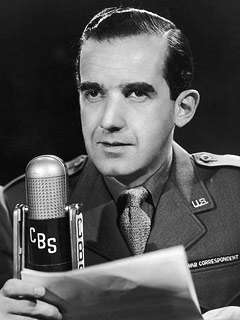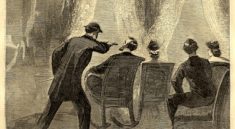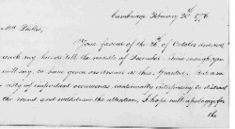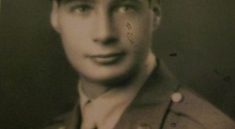Edward R. Murrow’s Churchill experience an Anglo American friendship, Churchill hoped sympathy for Britain’s plight would move the United States toward joining the war
From WinstonChurchill.org.
““This…is London”: Ed Murrow’s Churchill Experience An Anglo-American Friendship”
“With Hitler’s Luftwaffe pounding London in September 1940, Edward R. Murrow, chief European correspondent for the Columbia Broadcasting System, wanted to be closer to the story. For weeks, Murrow had been asking the Air Ministry for permission to send live broadcasts on the German raids to America from London’s rooftops. The Ministry had refused. Censors could not be sure what the American correspondent might report in a live broadcast.
To address the Air Ministry’s concerns, Murrow and a sound technician went up to the roof of the British Broadcasting Corporation building and recorded a description of an air attack on London. The Ministry told Murrow it sounded fine but again refused permission. Murrow made six more test recordings so that the officials could be sure that he had not compromised security. Although they did not find any violations, Murrow’s request was again turned down.
Morrow was undeterred.
Through his influential contacts, Murrow reached the Prime Minister. A former war correspondent himself, Churchill approved the broadcasts.[2] He hoped that Murrow’s radio reports would affect American public opinion, that sympathy for Britain’s plight would move the United States toward joining the war. Privately, Churchill was convinced that American belligerence was the surest key to ultimate victory.
With Churchill’s approval, Murrow began reporting from London’s rooftops on Britain’s fight for survival. In his elegant and distinctive voice, listeners in America heard Murrow’s first rooftop broadcast on 21 September 1940. Murrow began the broadcast with his famous signature opening, so familiar to his audience since 1937, “This is London.”
I am standing on a rooftop looking out over London. At the moment everything is quiet. For reasons of national as well as personal security, I’m unable to tell you the exact location from which I’m speaking. Off to my left, far away in the distance, I can see just that faint red angry snap of anti-aircraft bursts against the steel-blue sky, but the guns are so far away that’s impossible to hear them from this location.
Searchlights flooded the sky on Murrow’s right: I think probably in a minute we shall have the sound of guns in the immediate vicinity. The lights are swinging over in this general direction now. You’ll hear two explosions. There they are! That was the explosion overhead, not the guns themselves. I should think in a few minutes there may be a bit of shrapnel around here. Coming in, moving a little closer all the while.[3]
Egbert Roscoe Murrow was born in Polecat Creek, North Carolina on 25 April 1908. The youngest of three sons born to Ethel Lamb and Roscoe Murrow, Egbert grew up in a house made of yellow poplar and black walnut logs. The Murrows were Quaker landowners, whose antecedents had supported the Union in the Civil War and favored the abolition of slavery. In 1913, the family moved west and settled on Puget Sound in Blanchard, Washington, where Ethel Murrow’s cousin lived. Egbert and his brothers, Dewey and Lacey, grew up in Blanchard, a community dependent on logging, railroads and farming.”
Read more:



